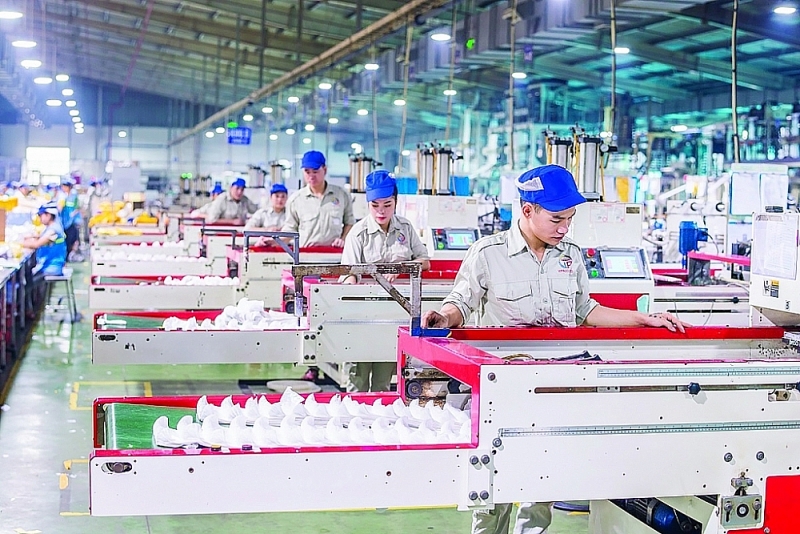Enterprise in action
In the context of the complex development of the Covid-19 pandemic, affecting the growth of the economy of Vietnam and other countries, the implementation of the resolution’s objectives and tasks of the XIII National Congress of the Party is still determined by enterprises to build, with the expectation that this will be a "fulcrum" for action.

Production activities at Viet Vipaco Packaging Company Photo: Vipaco
Take specific action
Recently, the Government issued Resolution No. 50/NQ-CP to implement the Resolution of the 13th Party Congress. It included 10 tasks for ministries, branches and localities to implement. In which, a number of contents are closely related to the development of the economy and firms such as: improving the quality of the socialist-oriented market economy institutions; vigorously develop science, technology and innovation to create breakthroughs and improve productivity; to step up industrialisation, modernisation and economic restructuring in association with renovating the growth model, ensuring substance and efficiency; improve the efficiency of foreign affairs, integration.
From this action, ministries, branches, localities as well as businesses have issued specific action plans, detailing goals to strive for and tasks to complete.
The Party Committee of the Central Business Sector has also issued Action Plan No. 08-CTr/DUK to implement the resolution. The set target is for enterprises with State capital to strive for an average revenue growth of 9%/year; profit before tax increased by 8%/year on average; return on equity (ROE) averaged 8%/year; 100% annual budget payment in accordance with the plan assigned by agencies. Particularly for commercial banks: total assets increased by 10%/year; credit growth of 10%/year; pre-tax profit increased by 12%/year; bad debt ratio below 3%.
One of the tasks is that enterprises must accelerate restructuring, innovation and improve the efficiency of production, business and services; preserve capital, State assets and enterprise value; ensure jobs and incomes for employees; increase investment, improve corporate governance capacity and quality of human resources; effectively implement the process of international economic integration, participate in the Fourth Industrial Revolution.
With the above common goal, each enterprise has also developed an action plan and recorded positive results.
At the Vietnam Tobacco Corporation (Vinataba), the Corporation's Party Committee also set targets, goals, key tasks and solutions to implement the Resolution of the XIII Congress close to the social-economic reality; suitable to the conditions of the corporation and the Party Committees/Departments under it. Vinataba strives to successfully fulfill the following targets: average revenue growth of 1%/year; profit increased by an average of 0.5%/year; ROE averaged 8%/year; budget payment increased by 2%/year on average; export turnover increased by 2%/year.
Although the pandemic had a significant impact on VietinBank's operations, the Party Committee and Board of Directors led and directed the disease prevention, control and control, and protected the bank activities. In in the practical implementation of tasks, VietinBank has always been consistent with the view that "Party building must be associated with the implementation of political tasks, preservation and development of capital assigned by the State; continue to affirm its pivotal role in the state economy, accompanying the development of the country”. Along with the direction of the Party, the determination and efforts of the whole system, the business results of VietinBank in the first six months of 2021 have seen positive changes: Credit balance as of June 30 is estimated. reached 1.06 million billion VND, up 4.8% compared to the end of 2020, the total mobilised capital was estimated at 1.2 million billion VND, up 3.4% compared to 2020; bad debt/credit balance is at 1.38%, which is low compared to industry average, bad debt coverage ratio is 109%. Profit in the first six months of 2021 is estimated at 13,000 billion VND.
Fiercely facing difficulties
The public and private sectors both contribute greatly to economic development in general. Many large corporations have become famous globally and many enterprises export up to millions of USD as well as increase investment abroad. Therefore, the fact that enterprises, ministries, branches and localities have issued action plans to implement the resolution of the 13th Party Congress shows their agility and timeliness, especially in the context of the pandemic.
But the gap from action programme to reality is big. Dr Vu Tien Loc, Chairman of the Vietnam Chamber of Commerce and Industry (VCCI), said to achieve these goals, the building of a modern and integrated market economy institution must be the pedestal and development platform. The digital economy must drive businesses to move forward. Three fronts of attack: institutions, human resources and infrastructure are breakthroughs. Enterprise is the main force. The private economy is the mainstay. The start-up nation is the guiding ecosystem.
Businesses see these are all difficult tasks to complete, so they need constant efforts and innovation. A representative of VietinBank's leadership shared the tasks of the 10-year strategy, three-year medium-term business plan as well as from now until the end of 2021 are extremely challenging, requiring all VietinBank to make more efforts, constantly innovate, seize market opportunities, overcome difficulties and limit ations; continue to improve financial capacity to create resources for long-term development.
As for the textile industry, the Vietnam National Textile and Garment Group (Vinatex) said it is facing difficulties due to the Covid-19 outbreak in the south - an area that contributes 60% of the group's income. Therefore, in addition to following the long-term goals according to the action plan, the immediate focus solution identified by the Vinatex Party Committee is to focus on leading the entire corporate governance system and political organisations to carry out disease prevention and control, minimise risks that may occur at large production facilities in the South and throughout the system.










